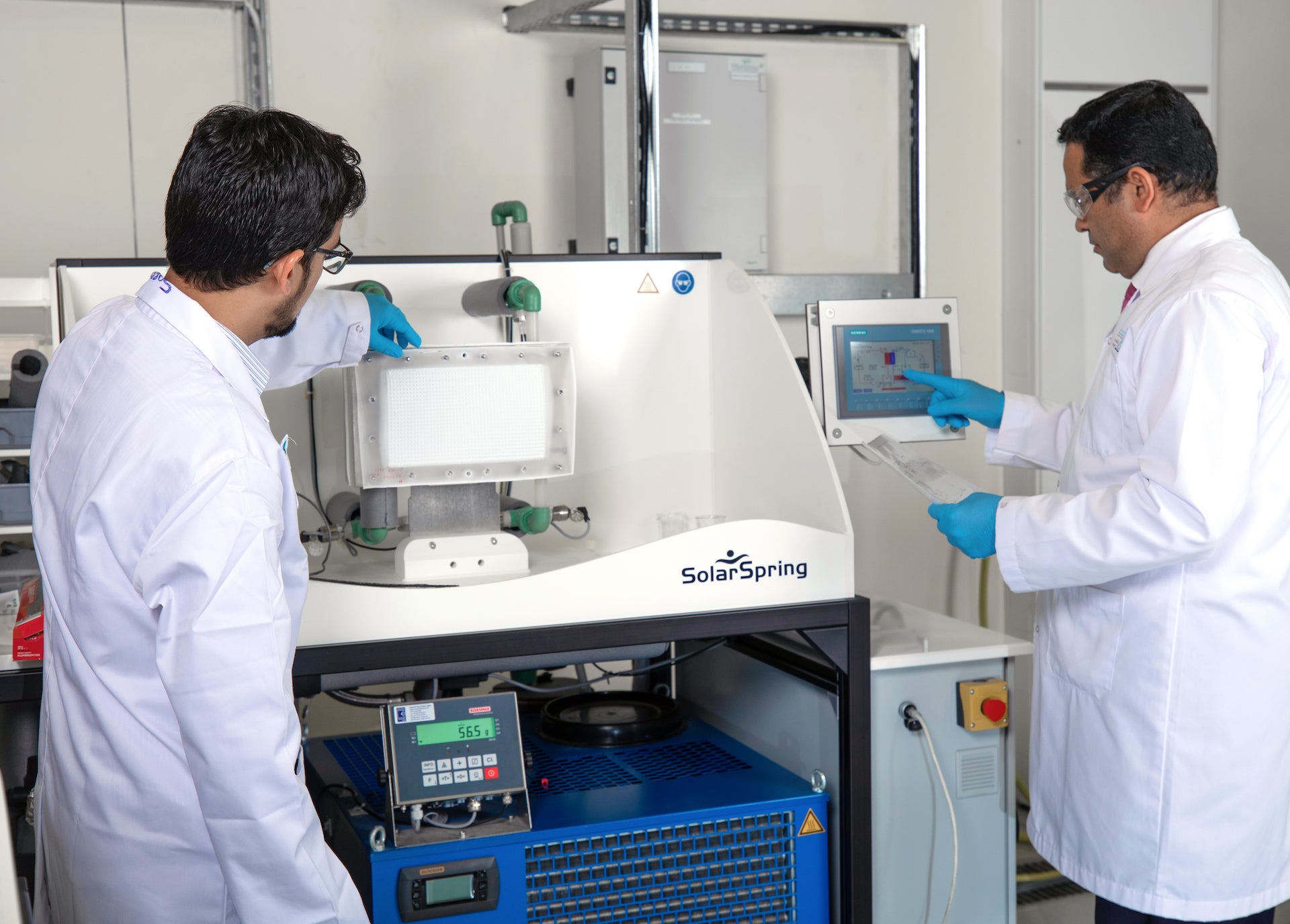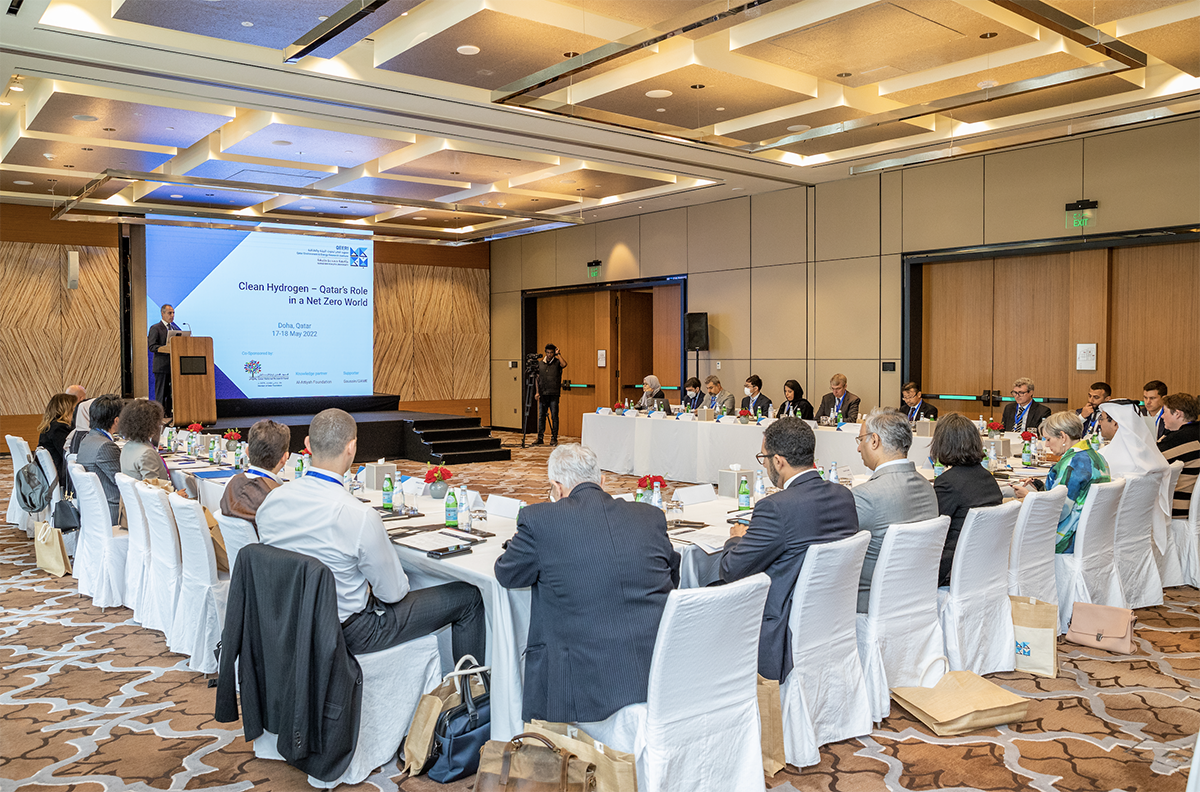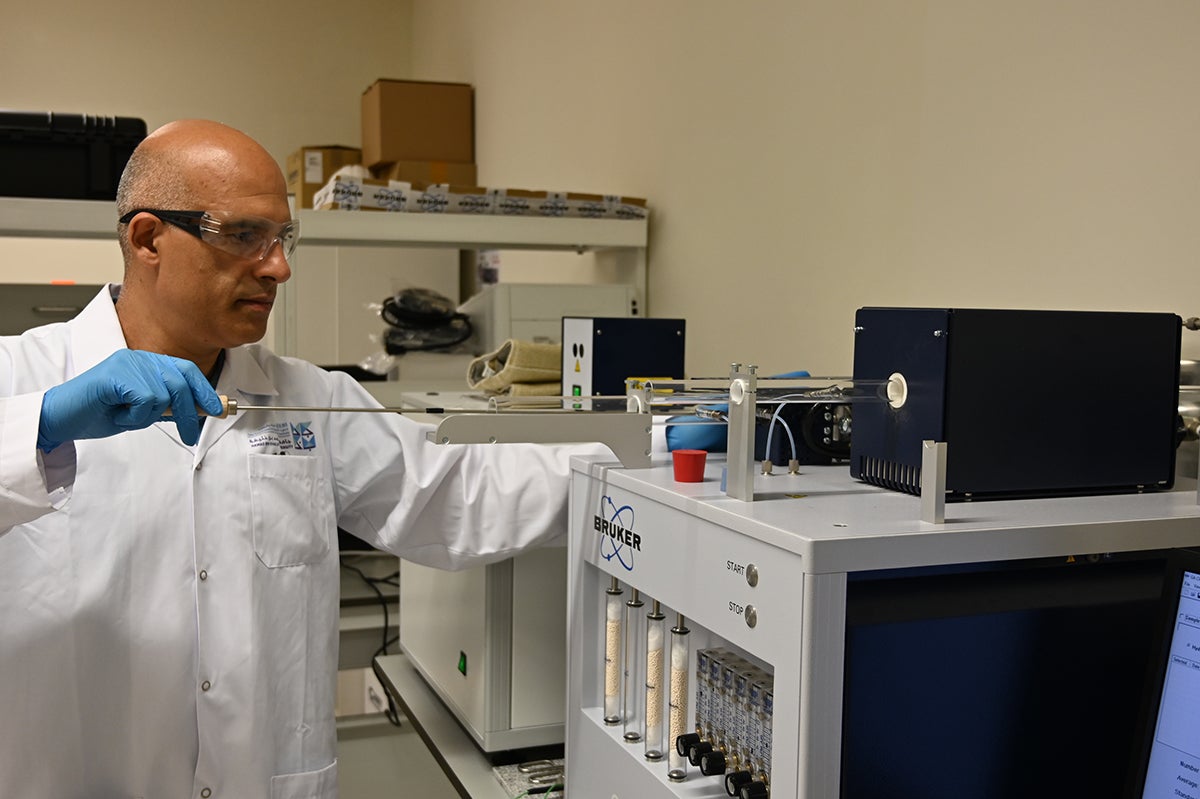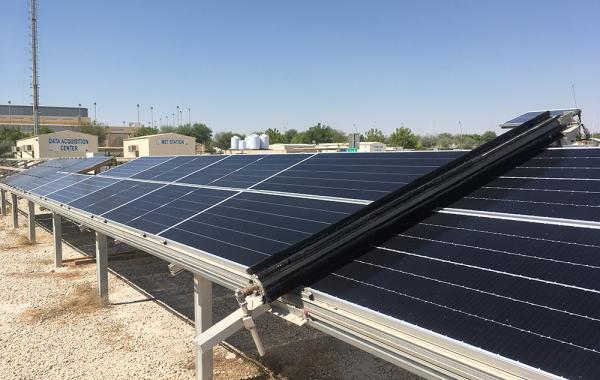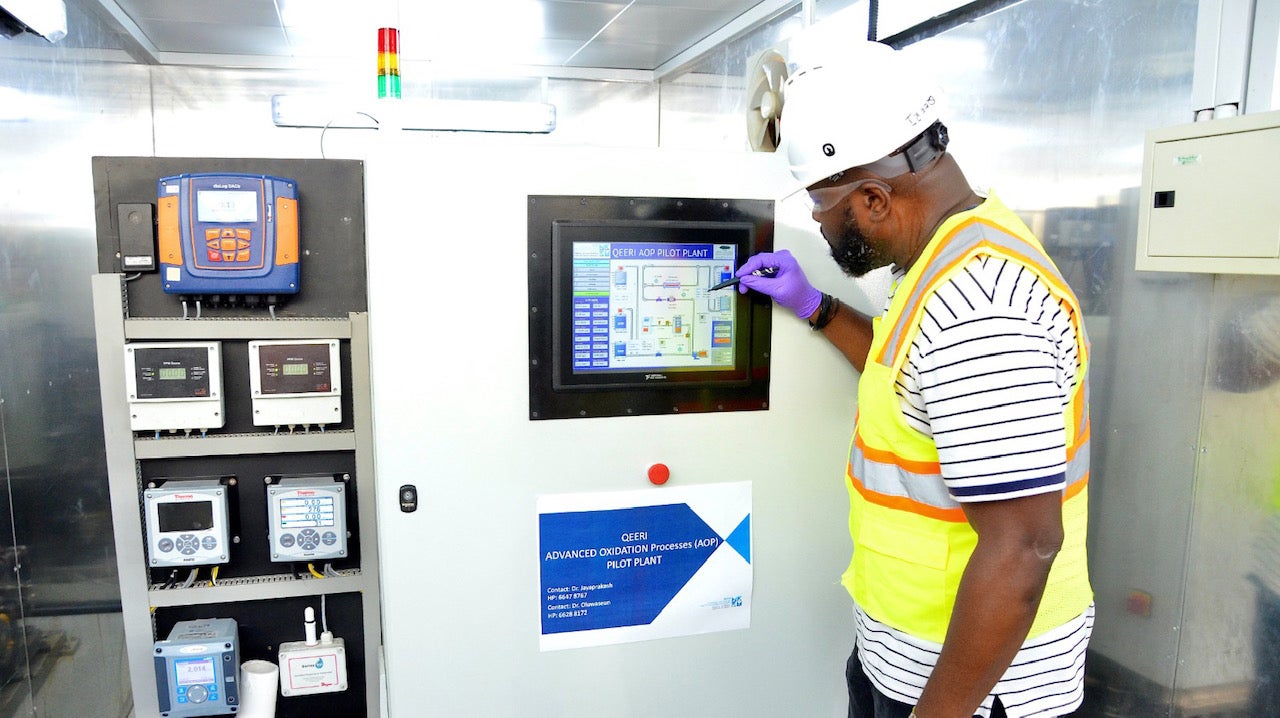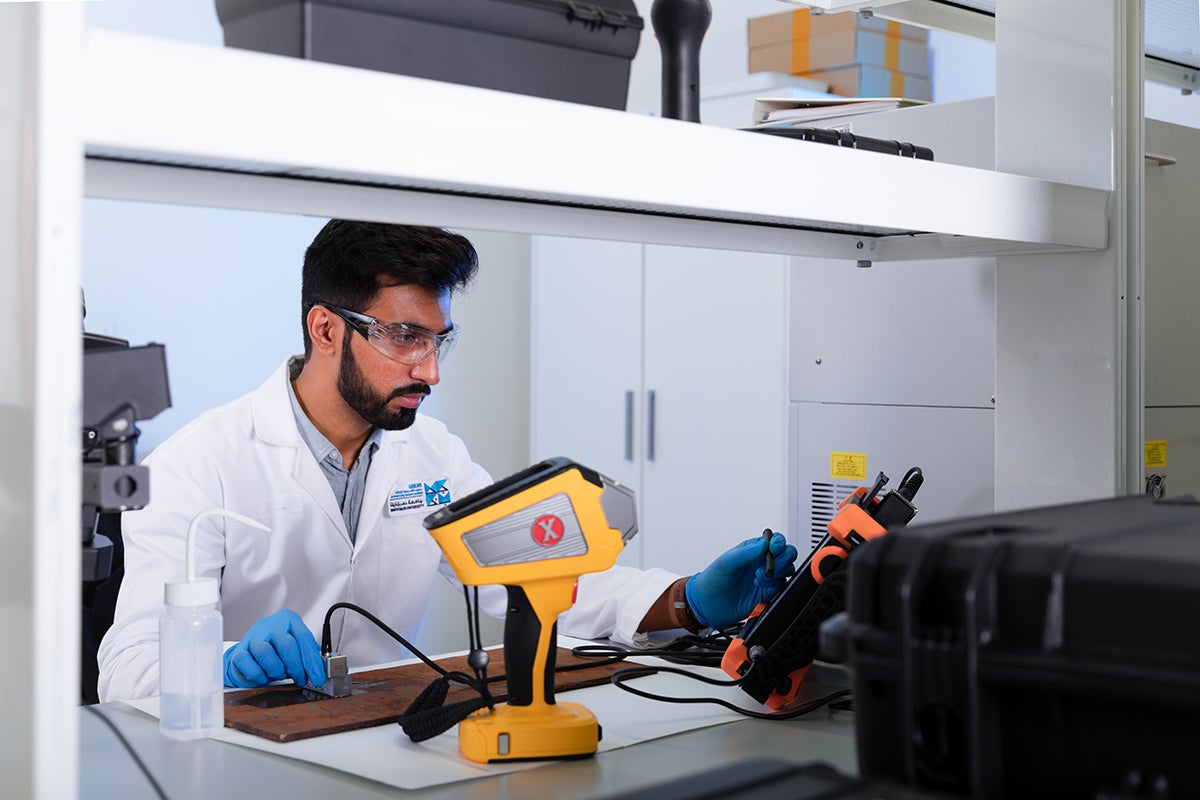
QEERI Collaborates with Mowasalat to Optimize Electric Bus System
QEERI’s scientific expertise to support Mowasalat’s sustainable public transportation strategy
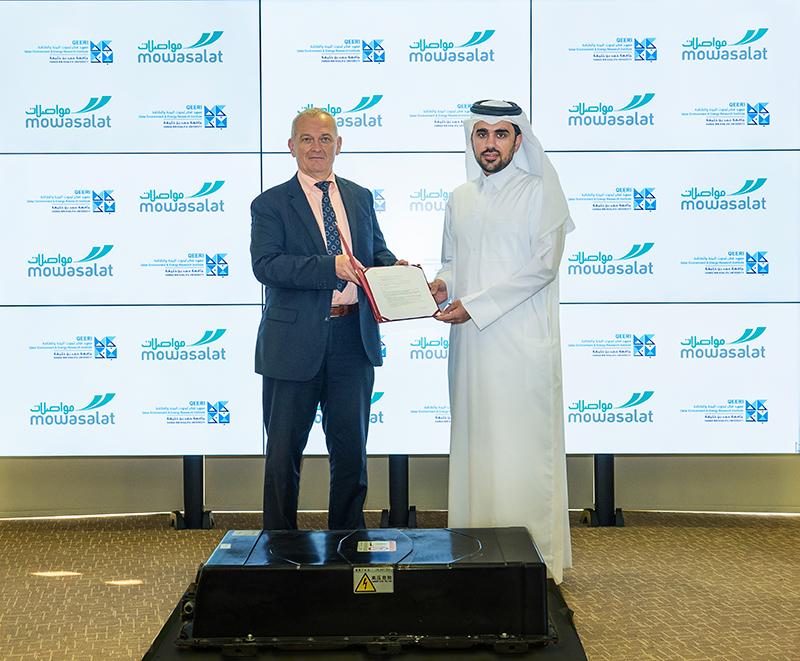
Qatar Environment and Energy Research Institute (QEERI), part of Hamad Bin Khalifa University (HBKU), and Mowasalat (Karwa), Qatar’s public transport company, have kicked off the Electric Bus lithium-ion battery cell testing project.
The project supports the research industry in exploring and experimenting with actual batteries that are being used in Mowasalat (Karwa) operations. Mowasalat (Karwa) began electrifying its public transit routes earlier this year and is set to operate a fleet of eco-friendly e-buses embedded in Qatar’s public transit system during the FIFA World Cup 2022.
The joint project will span from battery testing to various technical and operational aspects of the e-bus system. The first step is to develop an understanding and analysis of challenges described in similar international case studies in the field of bus electrification and techniques for problem-solving and decision making.
QEERI scientists will also develop a safety risk assessment matrix based on scientific experience, as a structured approach to assessing the likelihood and severity of identified hazards and their consequences, while determining mitigation actions. Additionally, QEERI will study battery reliability aspects at cell level, identifying cycling and calendar aging, and developing models to optimize battery operations and mitigate damage.
Eng. Ahmed Al Obaidly, Mowasalat (Karwa) COO, commented: “Mowasalat (Karwa) has invested heavily in fulfilling a commitment to providing modern, eco-friendly transport solutions using the latest technological innovation. We are delighted to now have the expertise of a national research entity like QEERI to conduct such an in-depth scientific study. The results of our efforts will have a significant role in Qatar’s sustainable development legacy. We are proud to actively contribute to the sustainability goals of the QNV 2030.”
He added: “Mowasalat (Karwa) is also involving technical innovation at every stage to ensure they can adapt to the fast-evolving global transportation sector to connect Qatar safely and sustainably, with a green footprint. Quality and safety play a vital role at Mowasalat (Karwa), and we are also on a mission to achieve net-zero emissions by 2030.”
Mowasalat (Karwa) and its team of electrical engineers will contribute mobility and other relevant data as well as battery cells from an actual e-bus and electric car to support the charging station tests operated by QEERI for its own research projects. QEERI’s Energy Center is pursuing research, development, and innovation to develop solutions that can increase vehicle battery performance and longevity in Qatar’s harsh climate, which could extend to electric vehicles in future.
Dr. Marc Vermeersch, QEERI Executive Director, said: “Sustainable, green mobility, with its shift to eco-friendly transportation systems, has an important role in Qatar’s long-term sustainability strategy. We are therefore honored that the expertise of QEERI’s scientists and our state-of-the-art facilities will contribute to Mowasalat (Karwa)’s electric bus fleet optimization. By supporting the efforts of such an important stakeholder, QEERI aligns our research and innovation with the country’s target of having fully eco-friendly public transportation by 2030.”
Commenting on the project, Dr. Veronica Bermudez, Senior Research Director at QEERI’s Energy Center, said: “At the center, we are developing innovative technologies for designing an EV charging infrastructure with integrated energy storage system and simultaneous utilization of local solar photovoltaic (PV) energy resources, towards minimizing the adverse effect on Qatar’s power grid. We aim to address the fundamental challenges in grid integration of EV charging infrastructure in Qatar by exploiting the synergy between innovative autonomous control schemes, real-time grid modeling, deep learning-based methods for optimal charging or discharging scenarios.”
Related News
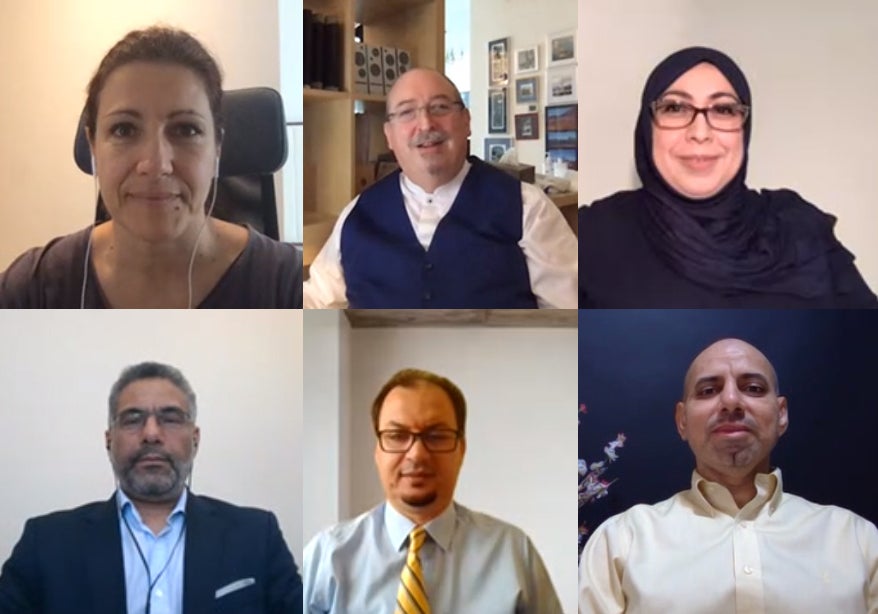
QEERI at HBKU to Lead New Project Focused on Reducing Atmospheric Carbon Dioxide
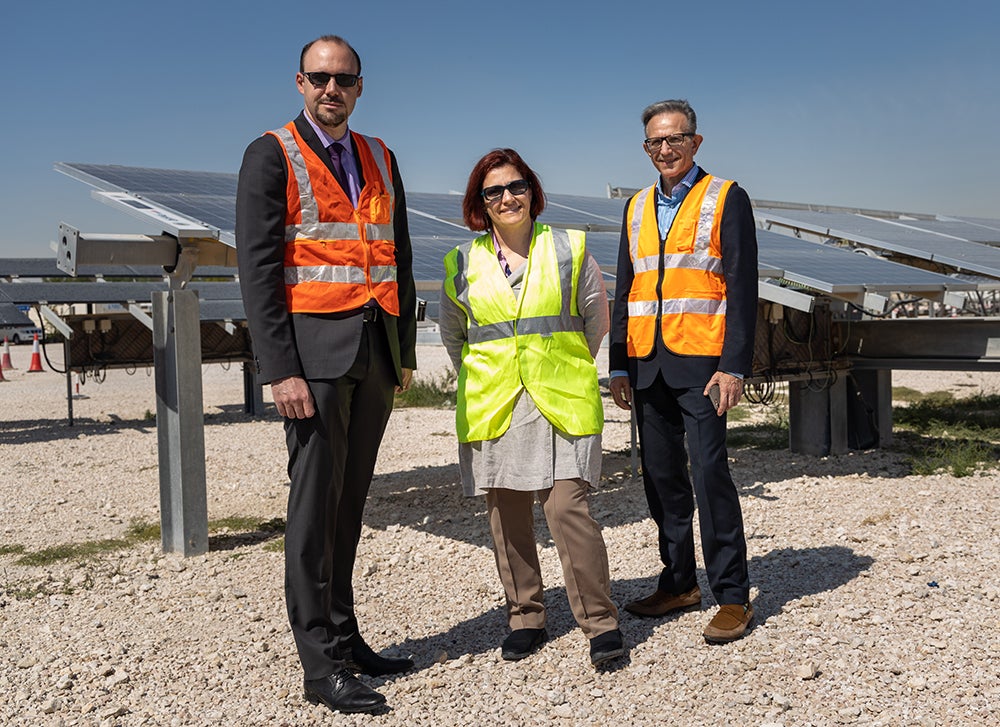
Qatar Environment and Energy Research Institute Providing Key Data for Development of Al Kharsaah 800MWp Photovoltaic Plant
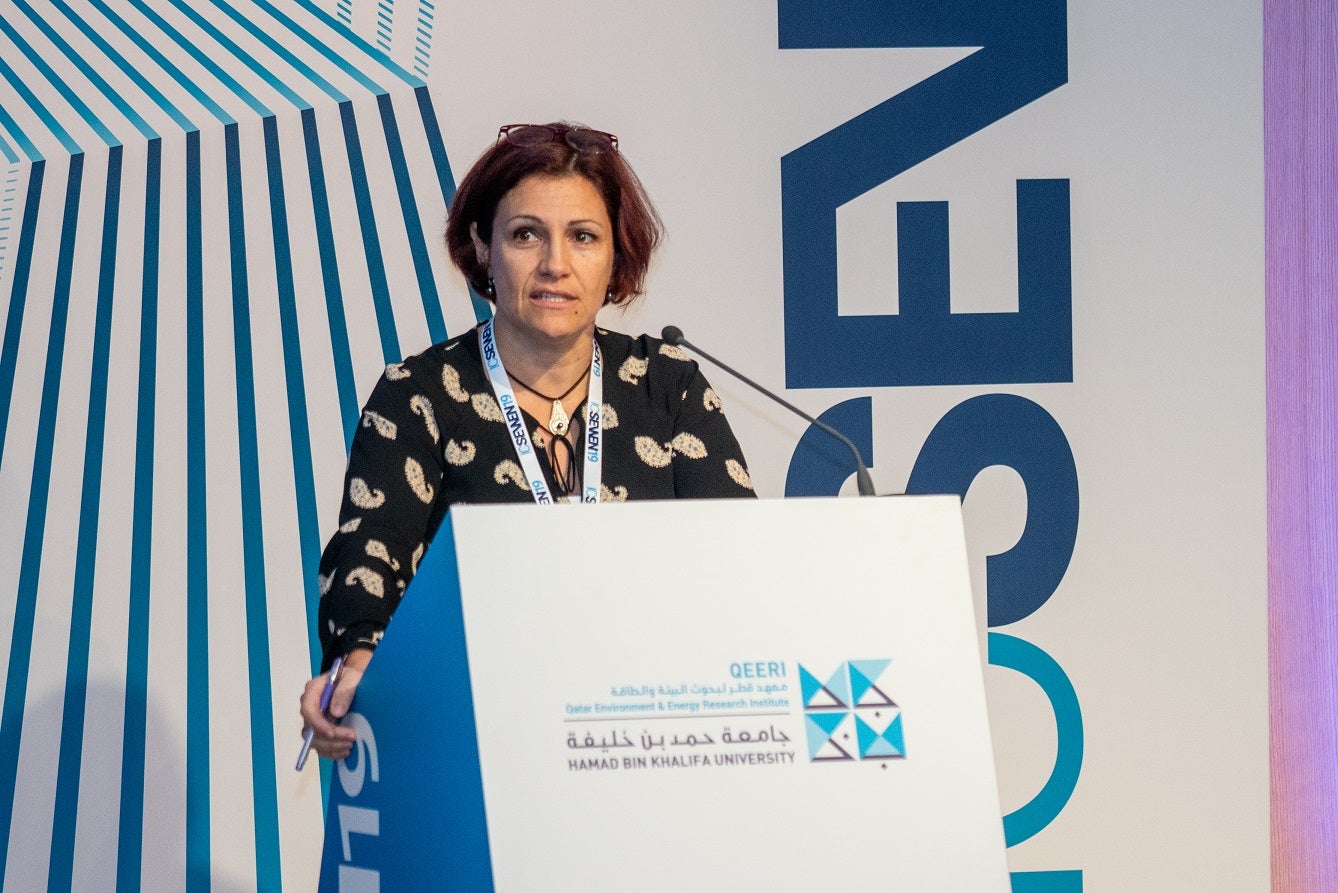
Experts Combine Efforts to Address Climate Challenges at Qatar Environment and Energy Research Institute Conference
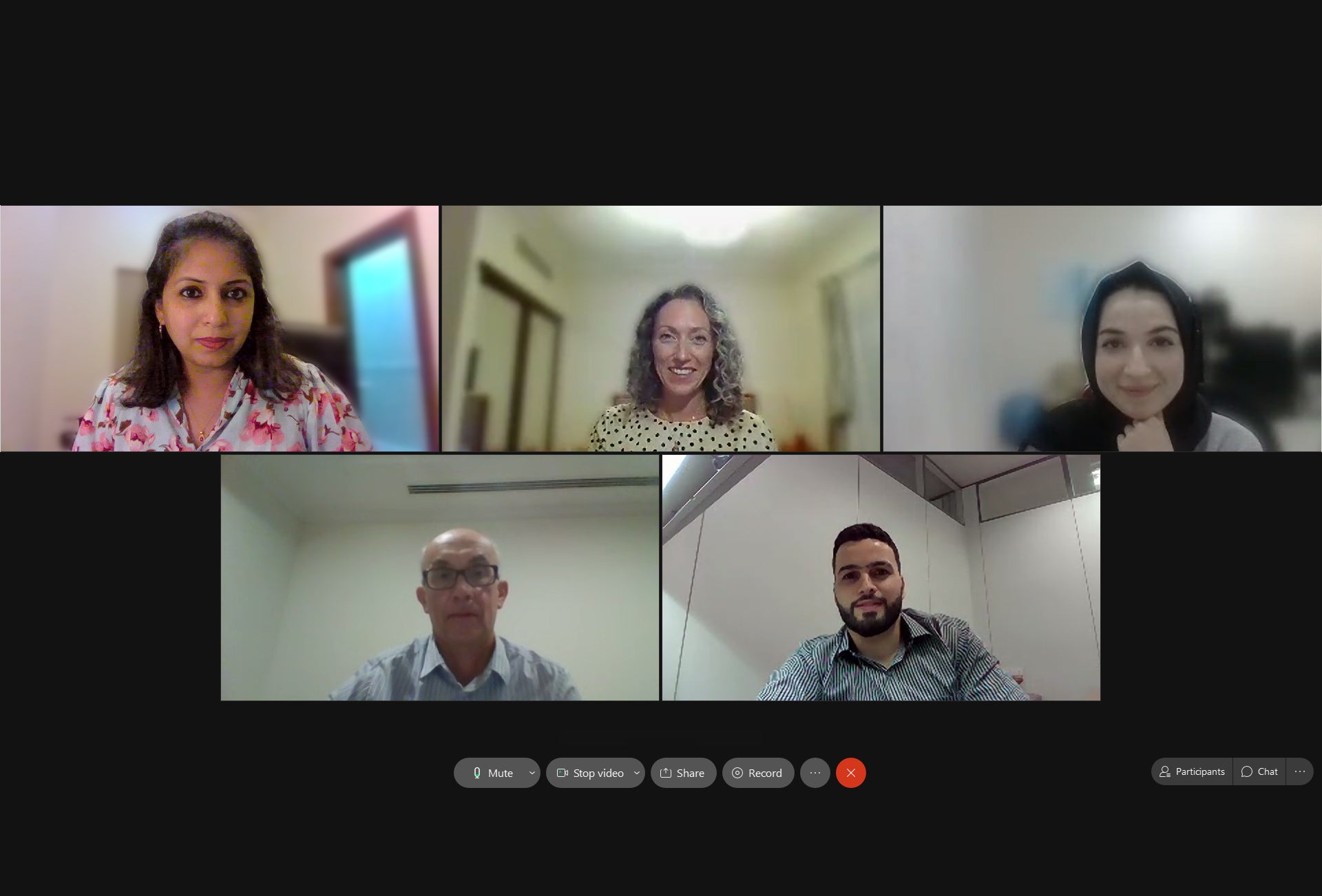
Qatar Environment and Energy Research Institute’s Second Science Majlis Promotes Awareness of Managing Scarce Water Resources
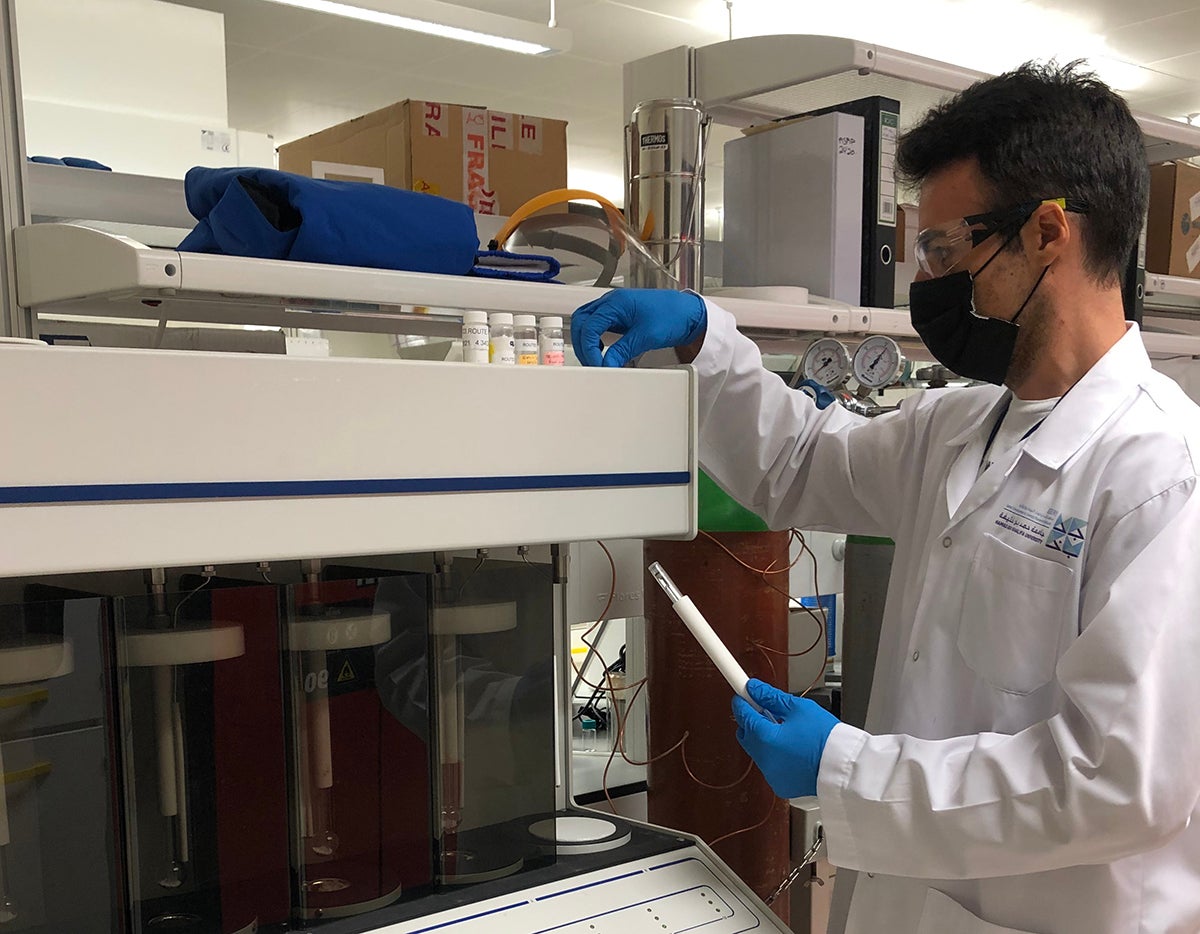
Research and Development Efforts by Qatar Environment and Energy Research Institute Focus on Innovation in Carbon Capture, Utilization, and Storage Technologies
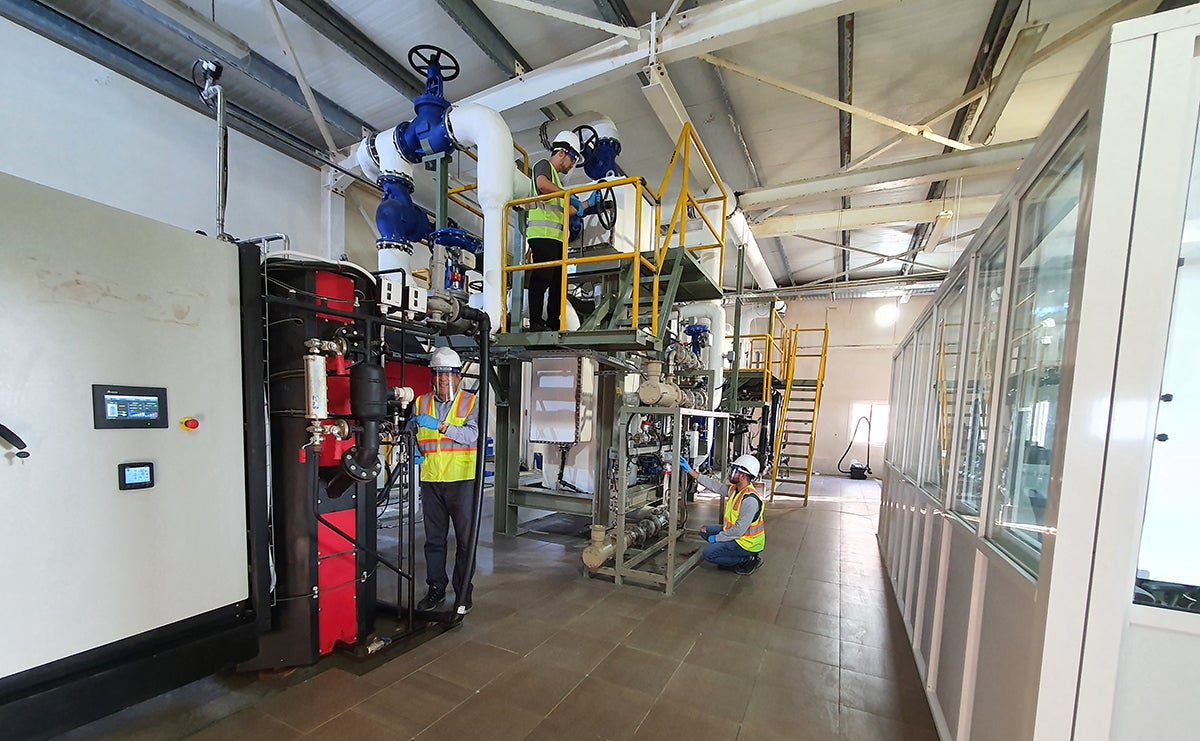
Qatar Environment and Energy Research Institute Develops and Installs MED Seawater Desalination Pilot Plant in Dukhan
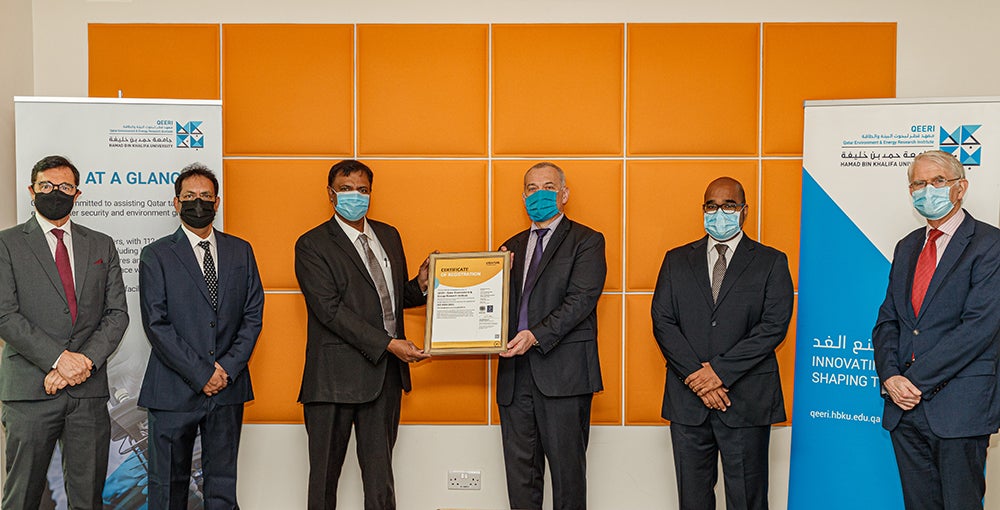
HBKU’s Qatar Environment and Energy Research Institute Awarded ISO Certification for its Integrated Management System
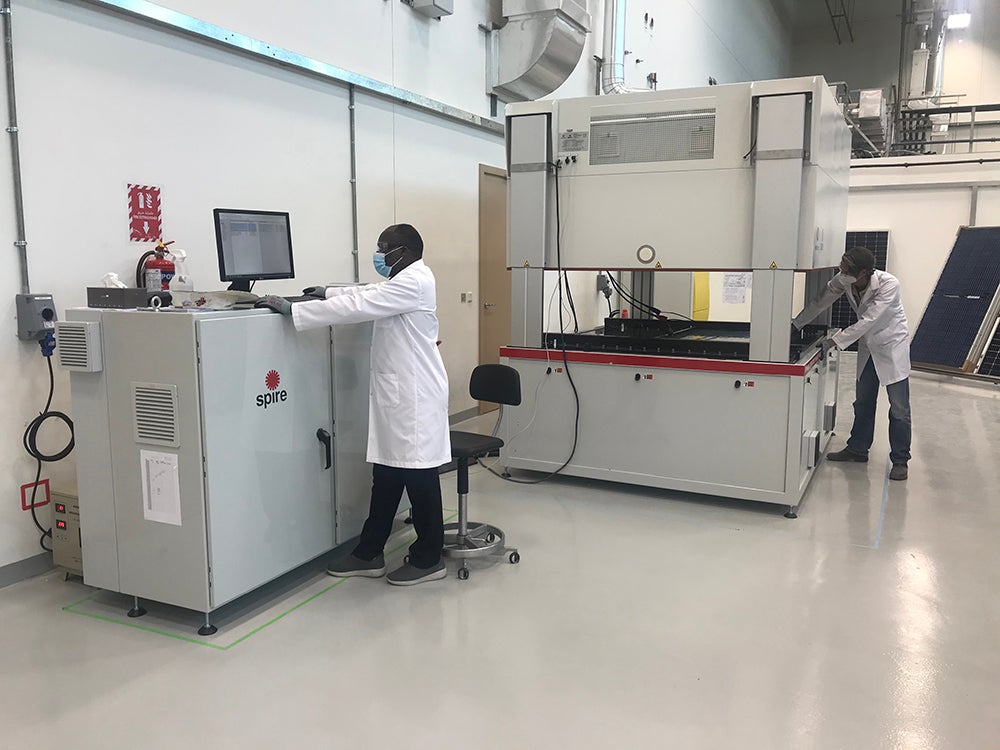
HBKU’s Qatar Environment and Energy Research Institute a Growing Force in Solar Technology Research
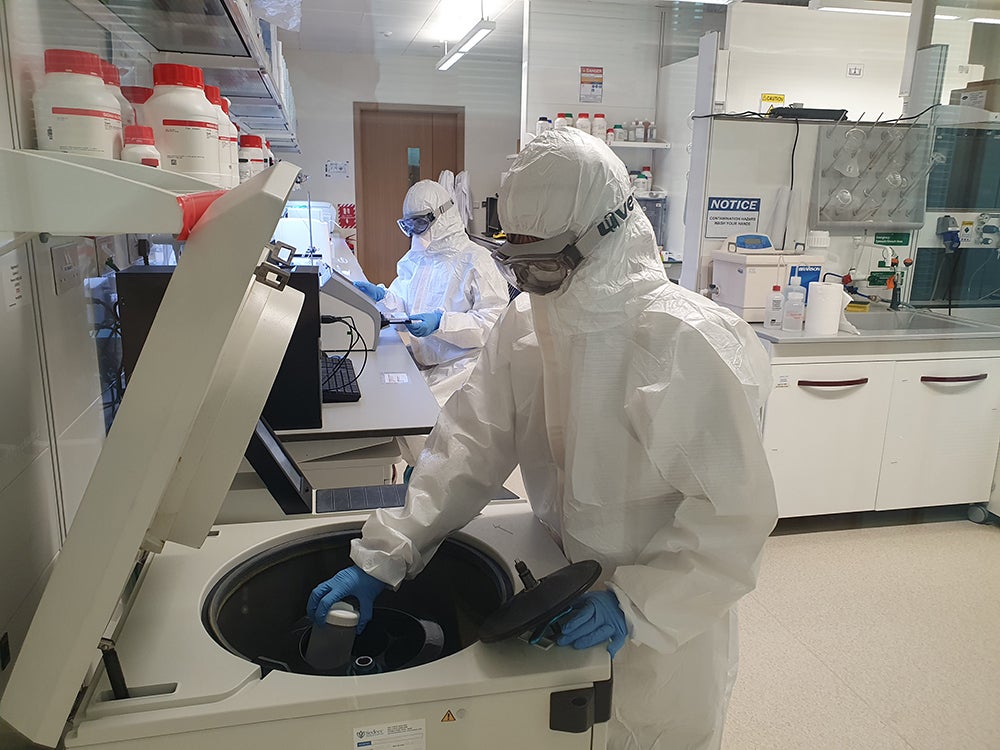
HBKU’s Qatar Environment and Energy Research Institute and Qatar Stakeholders Collaborative Project Aims to Detect COVID-19 in Wastewater
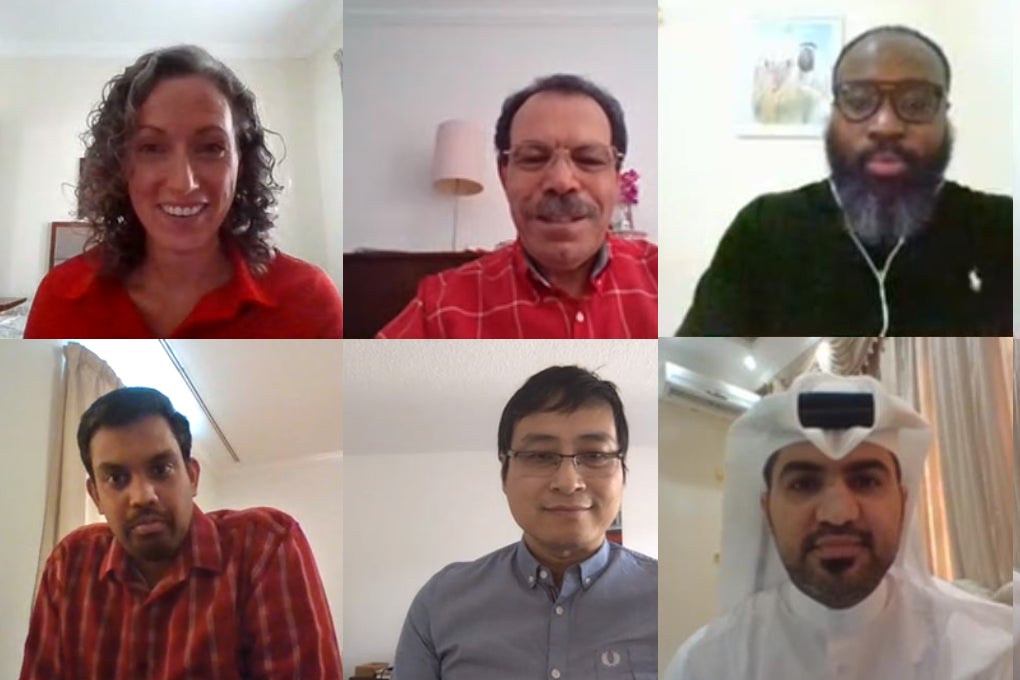
Qatar Environment and Energy Research Institute at HBKU Develops New Technology to Remove Oil from Seawater

QEERI at HBKU to Lead New Project Focused on Reducing Atmospheric Carbon Dioxide

Qatar Environment and Energy Research Institute Providing Key Data for Development of Al Kharsaah 800MWp Photovoltaic Plant

Experts Combine Efforts to Address Climate Challenges at Qatar Environment and Energy Research Institute Conference

Qatar Environment and Energy Research Institute’s Second Science Majlis Promotes Awareness of Managing Scarce Water Resources

Research and Development Efforts by Qatar Environment and Energy Research Institute Focus on Innovation in Carbon Capture, Utilization, and Storage Technologies

Qatar Environment and Energy Research Institute Develops and Installs MED Seawater Desalination Pilot Plant in Dukhan

HBKU’s Qatar Environment and Energy Research Institute Awarded ISO Certification for its Integrated Management System

HBKU’s Qatar Environment and Energy Research Institute a Growing Force in Solar Technology Research

HBKU’s Qatar Environment and Energy Research Institute and Qatar Stakeholders Collaborative Project Aims to Detect COVID-19 in Wastewater

Qatar Environment and Energy Research Institute at HBKU Develops New Technology to Remove Oil from Seawater

QEERI at HBKU to Lead New Project Focused on Reducing Atmospheric Carbon Dioxide

Qatar Environment and Energy Research Institute Providing Key Data for Development of Al Kharsaah 800MWp Photovoltaic Plant

Experts Combine Efforts to Address Climate Challenges at Qatar Environment and Energy Research Institute Conference

Qatar Environment and Energy Research Institute’s Second Science Majlis Promotes Awareness of Managing Scarce Water Resources

Research and Development Efforts by Qatar Environment and Energy Research Institute Focus on Innovation in Carbon Capture, Utilization, and Storage Technologies

Qatar Environment and Energy Research Institute Develops and Installs MED Seawater Desalination Pilot Plant in Dukhan

HBKU’s Qatar Environment and Energy Research Institute Awarded ISO Certification for its Integrated Management System

HBKU’s Qatar Environment and Energy Research Institute a Growing Force in Solar Technology Research

HBKU’s Qatar Environment and Energy Research Institute and Qatar Stakeholders Collaborative Project Aims to Detect COVID-19 in Wastewater

Qatar Environment and Energy Research Institute at HBKU Develops New Technology to Remove Oil from Seawater

QEERI at HBKU to Lead New Project Focused on Reducing Atmospheric Carbon Dioxide

Qatar Environment and Energy Research Institute Providing Key Data for Development of Al Kharsaah 800MWp Photovoltaic Plant

Experts Combine Efforts to Address Climate Challenges at Qatar Environment and Energy Research Institute Conference

Qatar Environment and Energy Research Institute’s Second Science Majlis Promotes Awareness of Managing Scarce Water Resources

Research and Development Efforts by Qatar Environment and Energy Research Institute Focus on Innovation in Carbon Capture, Utilization, and Storage Technologies

Qatar Environment and Energy Research Institute Develops and Installs MED Seawater Desalination Pilot Plant in Dukhan

HBKU’s Qatar Environment and Energy Research Institute Awarded ISO Certification for its Integrated Management System

HBKU’s Qatar Environment and Energy Research Institute a Growing Force in Solar Technology Research

HBKU’s Qatar Environment and Energy Research Institute and Qatar Stakeholders Collaborative Project Aims to Detect COVID-19 in Wastewater

Qatar Environment and Energy Research Institute at HBKU Develops New Technology to Remove Oil from Seawater

QEERI at HBKU to Lead New Project Focused on Reducing Atmospheric Carbon Dioxide

Qatar Environment and Energy Research Institute Providing Key Data for Development of Al Kharsaah 800MWp Photovoltaic Plant

Experts Combine Efforts to Address Climate Challenges at Qatar Environment and Energy Research Institute Conference

Qatar Environment and Energy Research Institute’s Second Science Majlis Promotes Awareness of Managing Scarce Water Resources

Research and Development Efforts by Qatar Environment and Energy Research Institute Focus on Innovation in Carbon Capture, Utilization, and Storage Technologies

Qatar Environment and Energy Research Institute Develops and Installs MED Seawater Desalination Pilot Plant in Dukhan

HBKU’s Qatar Environment and Energy Research Institute Awarded ISO Certification for its Integrated Management System

HBKU’s Qatar Environment and Energy Research Institute a Growing Force in Solar Technology Research

HBKU’s Qatar Environment and Energy Research Institute and Qatar Stakeholders Collaborative Project Aims to Detect COVID-19 in Wastewater

Qatar Environment and Energy Research Institute at HBKU Develops New Technology to Remove Oil from Seawater

QEERI at HBKU to Lead New Project Focused on Reducing Atmospheric Carbon Dioxide

Qatar Environment and Energy Research Institute Providing Key Data for Development of Al Kharsaah 800MWp Photovoltaic Plant

Experts Combine Efforts to Address Climate Challenges at Qatar Environment and Energy Research Institute Conference

Qatar Environment and Energy Research Institute’s Second Science Majlis Promotes Awareness of Managing Scarce Water Resources

Research and Development Efforts by Qatar Environment and Energy Research Institute Focus on Innovation in Carbon Capture, Utilization, and Storage Technologies

Qatar Environment and Energy Research Institute Develops and Installs MED Seawater Desalination Pilot Plant in Dukhan

HBKU’s Qatar Environment and Energy Research Institute Awarded ISO Certification for its Integrated Management System

HBKU’s Qatar Environment and Energy Research Institute a Growing Force in Solar Technology Research

HBKU’s Qatar Environment and Energy Research Institute and Qatar Stakeholders Collaborative Project Aims to Detect COVID-19 in Wastewater

Qatar Environment and Energy Research Institute at HBKU Develops New Technology to Remove Oil from Seawater

QEERI at HBKU to Lead New Project Focused on Reducing Atmospheric Carbon Dioxide

Qatar Environment and Energy Research Institute Providing Key Data for Development of Al Kharsaah 800MWp Photovoltaic Plant

Experts Combine Efforts to Address Climate Challenges at Qatar Environment and Energy Research Institute Conference

Qatar Environment and Energy Research Institute’s Second Science Majlis Promotes Awareness of Managing Scarce Water Resources

Research and Development Efforts by Qatar Environment and Energy Research Institute Focus on Innovation in Carbon Capture, Utilization, and Storage Technologies

Qatar Environment and Energy Research Institute Develops and Installs MED Seawater Desalination Pilot Plant in Dukhan

HBKU’s Qatar Environment and Energy Research Institute Awarded ISO Certification for its Integrated Management System

HBKU’s Qatar Environment and Energy Research Institute a Growing Force in Solar Technology Research

HBKU’s Qatar Environment and Energy Research Institute and Qatar Stakeholders Collaborative Project Aims to Detect COVID-19 in Wastewater

Qatar Environment and Energy Research Institute at HBKU Develops New Technology to Remove Oil from Seawater

QEERI at HBKU to Lead New Project Focused on Reducing Atmospheric Carbon Dioxide

Qatar Environment and Energy Research Institute Providing Key Data for Development of Al Kharsaah 800MWp Photovoltaic Plant

Experts Combine Efforts to Address Climate Challenges at Qatar Environment and Energy Research Institute Conference

Qatar Environment and Energy Research Institute’s Second Science Majlis Promotes Awareness of Managing Scarce Water Resources

Research and Development Efforts by Qatar Environment and Energy Research Institute Focus on Innovation in Carbon Capture, Utilization, and Storage Technologies

Qatar Environment and Energy Research Institute Develops and Installs MED Seawater Desalination Pilot Plant in Dukhan

HBKU’s Qatar Environment and Energy Research Institute Awarded ISO Certification for its Integrated Management System

HBKU’s Qatar Environment and Energy Research Institute a Growing Force in Solar Technology Research

HBKU’s Qatar Environment and Energy Research Institute and Qatar Stakeholders Collaborative Project Aims to Detect COVID-19 in Wastewater

Qatar Environment and Energy Research Institute at HBKU Develops New Technology to Remove Oil from Seawater

QEERI at HBKU to Lead New Project Focused on Reducing Atmospheric Carbon Dioxide

Qatar Environment and Energy Research Institute Providing Key Data for Development of Al Kharsaah 800MWp Photovoltaic Plant

Experts Combine Efforts to Address Climate Challenges at Qatar Environment and Energy Research Institute Conference

Qatar Environment and Energy Research Institute’s Second Science Majlis Promotes Awareness of Managing Scarce Water Resources

Research and Development Efforts by Qatar Environment and Energy Research Institute Focus on Innovation in Carbon Capture, Utilization, and Storage Technologies

Qatar Environment and Energy Research Institute Develops and Installs MED Seawater Desalination Pilot Plant in Dukhan

HBKU’s Qatar Environment and Energy Research Institute Awarded ISO Certification for its Integrated Management System

HBKU’s Qatar Environment and Energy Research Institute a Growing Force in Solar Technology Research

HBKU’s Qatar Environment and Energy Research Institute and Qatar Stakeholders Collaborative Project Aims to Detect COVID-19 in Wastewater

Qatar Environment and Energy Research Institute at HBKU Develops New Technology to Remove Oil from Seawater

QEERI at HBKU to Lead New Project Focused on Reducing Atmospheric Carbon Dioxide

Qatar Environment and Energy Research Institute Providing Key Data for Development of Al Kharsaah 800MWp Photovoltaic Plant

Experts Combine Efforts to Address Climate Challenges at Qatar Environment and Energy Research Institute Conference

Qatar Environment and Energy Research Institute’s Second Science Majlis Promotes Awareness of Managing Scarce Water Resources

Research and Development Efforts by Qatar Environment and Energy Research Institute Focus on Innovation in Carbon Capture, Utilization, and Storage Technologies

Qatar Environment and Energy Research Institute Develops and Installs MED Seawater Desalination Pilot Plant in Dukhan

HBKU’s Qatar Environment and Energy Research Institute Awarded ISO Certification for its Integrated Management System

HBKU’s Qatar Environment and Energy Research Institute a Growing Force in Solar Technology Research

HBKU’s Qatar Environment and Energy Research Institute and Qatar Stakeholders Collaborative Project Aims to Detect COVID-19 in Wastewater

Qatar Environment and Energy Research Institute at HBKU Develops New Technology to Remove Oil from Seawater

QEERI at HBKU to Lead New Project Focused on Reducing Atmospheric Carbon Dioxide

Qatar Environment and Energy Research Institute Providing Key Data for Development of Al Kharsaah 800MWp Photovoltaic Plant

Experts Combine Efforts to Address Climate Challenges at Qatar Environment and Energy Research Institute Conference

Qatar Environment and Energy Research Institute’s Second Science Majlis Promotes Awareness of Managing Scarce Water Resources

Research and Development Efforts by Qatar Environment and Energy Research Institute Focus on Innovation in Carbon Capture, Utilization, and Storage Technologies

Qatar Environment and Energy Research Institute Develops and Installs MED Seawater Desalination Pilot Plant in Dukhan

HBKU’s Qatar Environment and Energy Research Institute Awarded ISO Certification for its Integrated Management System

HBKU’s Qatar Environment and Energy Research Institute a Growing Force in Solar Technology Research

HBKU’s Qatar Environment and Energy Research Institute and Qatar Stakeholders Collaborative Project Aims to Detect COVID-19 in Wastewater

Qatar Environment and Energy Research Institute at HBKU Develops New Technology to Remove Oil from Seawater

QEERI at HBKU to Lead New Project Focused on Reducing Atmospheric Carbon Dioxide

Qatar Environment and Energy Research Institute Providing Key Data for Development of Al Kharsaah 800MWp Photovoltaic Plant

Experts Combine Efforts to Address Climate Challenges at Qatar Environment and Energy Research Institute Conference

Qatar Environment and Energy Research Institute’s Second Science Majlis Promotes Awareness of Managing Scarce Water Resources

Research and Development Efforts by Qatar Environment and Energy Research Institute Focus on Innovation in Carbon Capture, Utilization, and Storage Technologies

Qatar Environment and Energy Research Institute Develops and Installs MED Seawater Desalination Pilot Plant in Dukhan

HBKU’s Qatar Environment and Energy Research Institute Awarded ISO Certification for its Integrated Management System

HBKU’s Qatar Environment and Energy Research Institute a Growing Force in Solar Technology Research

HBKU’s Qatar Environment and Energy Research Institute and Qatar Stakeholders Collaborative Project Aims to Detect COVID-19 in Wastewater

Qatar Environment and Energy Research Institute at HBKU Develops New Technology to Remove Oil from Seawater

QEERI at HBKU to Lead New Project Focused on Reducing Atmospheric Carbon Dioxide

Qatar Environment and Energy Research Institute Providing Key Data for Development of Al Kharsaah 800MWp Photovoltaic Plant

Experts Combine Efforts to Address Climate Challenges at Qatar Environment and Energy Research Institute Conference

Qatar Environment and Energy Research Institute’s Second Science Majlis Promotes Awareness of Managing Scarce Water Resources

Research and Development Efforts by Qatar Environment and Energy Research Institute Focus on Innovation in Carbon Capture, Utilization, and Storage Technologies

Qatar Environment and Energy Research Institute Develops and Installs MED Seawater Desalination Pilot Plant in Dukhan

HBKU’s Qatar Environment and Energy Research Institute Awarded ISO Certification for its Integrated Management System

HBKU’s Qatar Environment and Energy Research Institute a Growing Force in Solar Technology Research

HBKU’s Qatar Environment and Energy Research Institute and Qatar Stakeholders Collaborative Project Aims to Detect COVID-19 in Wastewater

Qatar Environment and Energy Research Institute at HBKU Develops New Technology to Remove Oil from Seawater

QEERI at HBKU to Lead New Project Focused on Reducing Atmospheric Carbon Dioxide

Qatar Environment and Energy Research Institute Providing Key Data for Development of Al Kharsaah 800MWp Photovoltaic Plant

Experts Combine Efforts to Address Climate Challenges at Qatar Environment and Energy Research Institute Conference

Qatar Environment and Energy Research Institute’s Second Science Majlis Promotes Awareness of Managing Scarce Water Resources

Research and Development Efforts by Qatar Environment and Energy Research Institute Focus on Innovation in Carbon Capture, Utilization, and Storage Technologies

Qatar Environment and Energy Research Institute Develops and Installs MED Seawater Desalination Pilot Plant in Dukhan

HBKU’s Qatar Environment and Energy Research Institute Awarded ISO Certification for its Integrated Management System

HBKU’s Qatar Environment and Energy Research Institute a Growing Force in Solar Technology Research

HBKU’s Qatar Environment and Energy Research Institute and Qatar Stakeholders Collaborative Project Aims to Detect COVID-19 in Wastewater

Qatar Environment and Energy Research Institute at HBKU Develops New Technology to Remove Oil from Seawater

QEERI at HBKU to Lead New Project Focused on Reducing Atmospheric Carbon Dioxide

Qatar Environment and Energy Research Institute Providing Key Data for Development of Al Kharsaah 800MWp Photovoltaic Plant

Experts Combine Efforts to Address Climate Challenges at Qatar Environment and Energy Research Institute Conference

Qatar Environment and Energy Research Institute’s Second Science Majlis Promotes Awareness of Managing Scarce Water Resources

Research and Development Efforts by Qatar Environment and Energy Research Institute Focus on Innovation in Carbon Capture, Utilization, and Storage Technologies

Qatar Environment and Energy Research Institute Develops and Installs MED Seawater Desalination Pilot Plant in Dukhan

HBKU’s Qatar Environment and Energy Research Institute Awarded ISO Certification for its Integrated Management System

HBKU’s Qatar Environment and Energy Research Institute a Growing Force in Solar Technology Research

HBKU’s Qatar Environment and Energy Research Institute and Qatar Stakeholders Collaborative Project Aims to Detect COVID-19 in Wastewater

Qatar Environment and Energy Research Institute at HBKU Develops New Technology to Remove Oil from Seawater

QEERI at HBKU to Lead New Project Focused on Reducing Atmospheric Carbon Dioxide

Qatar Environment and Energy Research Institute Providing Key Data for Development of Al Kharsaah 800MWp Photovoltaic Plant

Experts Combine Efforts to Address Climate Challenges at Qatar Environment and Energy Research Institute Conference

Qatar Environment and Energy Research Institute’s Second Science Majlis Promotes Awareness of Managing Scarce Water Resources

Research and Development Efforts by Qatar Environment and Energy Research Institute Focus on Innovation in Carbon Capture, Utilization, and Storage Technologies

Qatar Environment and Energy Research Institute Develops and Installs MED Seawater Desalination Pilot Plant in Dukhan

HBKU’s Qatar Environment and Energy Research Institute Awarded ISO Certification for its Integrated Management System

HBKU’s Qatar Environment and Energy Research Institute a Growing Force in Solar Technology Research

HBKU’s Qatar Environment and Energy Research Institute and Qatar Stakeholders Collaborative Project Aims to Detect COVID-19 in Wastewater

Qatar Environment and Energy Research Institute at HBKU Develops New Technology to Remove Oil from Seawater

QEERI at HBKU to Lead New Project Focused on Reducing Atmospheric Carbon Dioxide

Qatar Environment and Energy Research Institute Providing Key Data for Development of Al Kharsaah 800MWp Photovoltaic Plant

Experts Combine Efforts to Address Climate Challenges at Qatar Environment and Energy Research Institute Conference

Qatar Environment and Energy Research Institute’s Second Science Majlis Promotes Awareness of Managing Scarce Water Resources

Research and Development Efforts by Qatar Environment and Energy Research Institute Focus on Innovation in Carbon Capture, Utilization, and Storage Technologies

Qatar Environment and Energy Research Institute Develops and Installs MED Seawater Desalination Pilot Plant in Dukhan

HBKU’s Qatar Environment and Energy Research Institute Awarded ISO Certification for its Integrated Management System

HBKU’s Qatar Environment and Energy Research Institute a Growing Force in Solar Technology Research

HBKU’s Qatar Environment and Energy Research Institute and Qatar Stakeholders Collaborative Project Aims to Detect COVID-19 in Wastewater

Qatar Environment and Energy Research Institute at HBKU Develops New Technology to Remove Oil from Seawater

QEERI at HBKU to Lead New Project Focused on Reducing Atmospheric Carbon Dioxide

Qatar Environment and Energy Research Institute Providing Key Data for Development of Al Kharsaah 800MWp Photovoltaic Plant

Experts Combine Efforts to Address Climate Challenges at Qatar Environment and Energy Research Institute Conference

Qatar Environment and Energy Research Institute’s Second Science Majlis Promotes Awareness of Managing Scarce Water Resources

Research and Development Efforts by Qatar Environment and Energy Research Institute Focus on Innovation in Carbon Capture, Utilization, and Storage Technologies

Qatar Environment and Energy Research Institute Develops and Installs MED Seawater Desalination Pilot Plant in Dukhan

HBKU’s Qatar Environment and Energy Research Institute Awarded ISO Certification for its Integrated Management System

HBKU’s Qatar Environment and Energy Research Institute a Growing Force in Solar Technology Research

HBKU’s Qatar Environment and Energy Research Institute and Qatar Stakeholders Collaborative Project Aims to Detect COVID-19 in Wastewater

Qatar Environment and Energy Research Institute at HBKU Develops New Technology to Remove Oil from Seawater

QEERI at HBKU to Lead New Project Focused on Reducing Atmospheric Carbon Dioxide

Qatar Environment and Energy Research Institute Providing Key Data for Development of Al Kharsaah 800MWp Photovoltaic Plant

Experts Combine Efforts to Address Climate Challenges at Qatar Environment and Energy Research Institute Conference

Qatar Environment and Energy Research Institute’s Second Science Majlis Promotes Awareness of Managing Scarce Water Resources

Research and Development Efforts by Qatar Environment and Energy Research Institute Focus on Innovation in Carbon Capture, Utilization, and Storage Technologies

Qatar Environment and Energy Research Institute Develops and Installs MED Seawater Desalination Pilot Plant in Dukhan

HBKU’s Qatar Environment and Energy Research Institute Awarded ISO Certification for its Integrated Management System

HBKU’s Qatar Environment and Energy Research Institute a Growing Force in Solar Technology Research

HBKU’s Qatar Environment and Energy Research Institute and Qatar Stakeholders Collaborative Project Aims to Detect COVID-19 in Wastewater

Qatar Environment and Energy Research Institute at HBKU Develops New Technology to Remove Oil from Seawater

QEERI at HBKU to Lead New Project Focused on Reducing Atmospheric Carbon Dioxide

Qatar Environment and Energy Research Institute Providing Key Data for Development of Al Kharsaah 800MWp Photovoltaic Plant

Experts Combine Efforts to Address Climate Challenges at Qatar Environment and Energy Research Institute Conference

Qatar Environment and Energy Research Institute’s Second Science Majlis Promotes Awareness of Managing Scarce Water Resources

Research and Development Efforts by Qatar Environment and Energy Research Institute Focus on Innovation in Carbon Capture, Utilization, and Storage Technologies

Qatar Environment and Energy Research Institute Develops and Installs MED Seawater Desalination Pilot Plant in Dukhan

HBKU’s Qatar Environment and Energy Research Institute Awarded ISO Certification for its Integrated Management System

HBKU’s Qatar Environment and Energy Research Institute a Growing Force in Solar Technology Research

HBKU’s Qatar Environment and Energy Research Institute and Qatar Stakeholders Collaborative Project Aims to Detect COVID-19 in Wastewater

Qatar Environment and Energy Research Institute at HBKU Develops New Technology to Remove Oil from Seawater

QEERI at HBKU to Lead New Project Focused on Reducing Atmospheric Carbon Dioxide

Qatar Environment and Energy Research Institute Providing Key Data for Development of Al Kharsaah 800MWp Photovoltaic Plant

Experts Combine Efforts to Address Climate Challenges at Qatar Environment and Energy Research Institute Conference

Qatar Environment and Energy Research Institute’s Second Science Majlis Promotes Awareness of Managing Scarce Water Resources

Research and Development Efforts by Qatar Environment and Energy Research Institute Focus on Innovation in Carbon Capture, Utilization, and Storage Technologies

Qatar Environment and Energy Research Institute Develops and Installs MED Seawater Desalination Pilot Plant in Dukhan

HBKU’s Qatar Environment and Energy Research Institute Awarded ISO Certification for its Integrated Management System

HBKU’s Qatar Environment and Energy Research Institute a Growing Force in Solar Technology Research

HBKU’s Qatar Environment and Energy Research Institute and Qatar Stakeholders Collaborative Project Aims to Detect COVID-19 in Wastewater

Qatar Environment and Energy Research Institute at HBKU Develops New Technology to Remove Oil from Seawater

QEERI at HBKU to Lead New Project Focused on Reducing Atmospheric Carbon Dioxide

Qatar Environment and Energy Research Institute Providing Key Data for Development of Al Kharsaah 800MWp Photovoltaic Plant

Experts Combine Efforts to Address Climate Challenges at Qatar Environment and Energy Research Institute Conference

Qatar Environment and Energy Research Institute’s Second Science Majlis Promotes Awareness of Managing Scarce Water Resources

Research and Development Efforts by Qatar Environment and Energy Research Institute Focus on Innovation in Carbon Capture, Utilization, and Storage Technologies

Qatar Environment and Energy Research Institute Develops and Installs MED Seawater Desalination Pilot Plant in Dukhan

HBKU’s Qatar Environment and Energy Research Institute Awarded ISO Certification for its Integrated Management System

HBKU’s Qatar Environment and Energy Research Institute a Growing Force in Solar Technology Research

HBKU’s Qatar Environment and Energy Research Institute and Qatar Stakeholders Collaborative Project Aims to Detect COVID-19 in Wastewater

Qatar Environment and Energy Research Institute at HBKU Develops New Technology to Remove Oil from Seawater

QEERI at HBKU to Lead New Project Focused on Reducing Atmospheric Carbon Dioxide

Qatar Environment and Energy Research Institute Providing Key Data for Development of Al Kharsaah 800MWp Photovoltaic Plant

Experts Combine Efforts to Address Climate Challenges at Qatar Environment and Energy Research Institute Conference

Qatar Environment and Energy Research Institute’s Second Science Majlis Promotes Awareness of Managing Scarce Water Resources

Research and Development Efforts by Qatar Environment and Energy Research Institute Focus on Innovation in Carbon Capture, Utilization, and Storage Technologies

Qatar Environment and Energy Research Institute Develops and Installs MED Seawater Desalination Pilot Plant in Dukhan

HBKU’s Qatar Environment and Energy Research Institute Awarded ISO Certification for its Integrated Management System

HBKU’s Qatar Environment and Energy Research Institute a Growing Force in Solar Technology Research

HBKU’s Qatar Environment and Energy Research Institute and Qatar Stakeholders Collaborative Project Aims to Detect COVID-19 in Wastewater

Qatar Environment and Energy Research Institute at HBKU Develops New Technology to Remove Oil from Seawater

QEERI at HBKU to Lead New Project Focused on Reducing Atmospheric Carbon Dioxide

Qatar Environment and Energy Research Institute Providing Key Data for Development of Al Kharsaah 800MWp Photovoltaic Plant

Experts Combine Efforts to Address Climate Challenges at Qatar Environment and Energy Research Institute Conference

Qatar Environment and Energy Research Institute’s Second Science Majlis Promotes Awareness of Managing Scarce Water Resources

Research and Development Efforts by Qatar Environment and Energy Research Institute Focus on Innovation in Carbon Capture, Utilization, and Storage Technologies

Qatar Environment and Energy Research Institute Develops and Installs MED Seawater Desalination Pilot Plant in Dukhan

HBKU’s Qatar Environment and Energy Research Institute Awarded ISO Certification for its Integrated Management System

HBKU’s Qatar Environment and Energy Research Institute a Growing Force in Solar Technology Research

HBKU’s Qatar Environment and Energy Research Institute and Qatar Stakeholders Collaborative Project Aims to Detect COVID-19 in Wastewater

Qatar Environment and Energy Research Institute at HBKU Develops New Technology to Remove Oil from Seawater

QEERI at HBKU to Lead New Project Focused on Reducing Atmospheric Carbon Dioxide

Qatar Environment and Energy Research Institute Providing Key Data for Development of Al Kharsaah 800MWp Photovoltaic Plant

Experts Combine Efforts to Address Climate Challenges at Qatar Environment and Energy Research Institute Conference

Qatar Environment and Energy Research Institute’s Second Science Majlis Promotes Awareness of Managing Scarce Water Resources

Research and Development Efforts by Qatar Environment and Energy Research Institute Focus on Innovation in Carbon Capture, Utilization, and Storage Technologies

Qatar Environment and Energy Research Institute Develops and Installs MED Seawater Desalination Pilot Plant in Dukhan

HBKU’s Qatar Environment and Energy Research Institute Awarded ISO Certification for its Integrated Management System

HBKU’s Qatar Environment and Energy Research Institute a Growing Force in Solar Technology Research

HBKU’s Qatar Environment and Energy Research Institute and Qatar Stakeholders Collaborative Project Aims to Detect COVID-19 in Wastewater

Qatar Environment and Energy Research Institute at HBKU Develops New Technology to Remove Oil from Seawater

QEERI at HBKU to Lead New Project Focused on Reducing Atmospheric Carbon Dioxide

Qatar Environment and Energy Research Institute Providing Key Data for Development of Al Kharsaah 800MWp Photovoltaic Plant

Experts Combine Efforts to Address Climate Challenges at Qatar Environment and Energy Research Institute Conference

Qatar Environment and Energy Research Institute’s Second Science Majlis Promotes Awareness of Managing Scarce Water Resources

Research and Development Efforts by Qatar Environment and Energy Research Institute Focus on Innovation in Carbon Capture, Utilization, and Storage Technologies

Qatar Environment and Energy Research Institute Develops and Installs MED Seawater Desalination Pilot Plant in Dukhan

HBKU’s Qatar Environment and Energy Research Institute Awarded ISO Certification for its Integrated Management System

HBKU’s Qatar Environment and Energy Research Institute a Growing Force in Solar Technology Research

HBKU’s Qatar Environment and Energy Research Institute and Qatar Stakeholders Collaborative Project Aims to Detect COVID-19 in Wastewater

Qatar Environment and Energy Research Institute at HBKU Develops New Technology to Remove Oil from Seawater

QEERI at HBKU to Lead New Project Focused on Reducing Atmospheric Carbon Dioxide

Qatar Environment and Energy Research Institute Providing Key Data for Development of Al Kharsaah 800MWp Photovoltaic Plant

Experts Combine Efforts to Address Climate Challenges at Qatar Environment and Energy Research Institute Conference

Qatar Environment and Energy Research Institute’s Second Science Majlis Promotes Awareness of Managing Scarce Water Resources

Research and Development Efforts by Qatar Environment and Energy Research Institute Focus on Innovation in Carbon Capture, Utilization, and Storage Technologies

Qatar Environment and Energy Research Institute Develops and Installs MED Seawater Desalination Pilot Plant in Dukhan

HBKU’s Qatar Environment and Energy Research Institute Awarded ISO Certification for its Integrated Management System

HBKU’s Qatar Environment and Energy Research Institute a Growing Force in Solar Technology Research

HBKU’s Qatar Environment and Energy Research Institute and Qatar Stakeholders Collaborative Project Aims to Detect COVID-19 in Wastewater

Qatar Environment and Energy Research Institute at HBKU Develops New Technology to Remove Oil from Seawater

QEERI at HBKU to Lead New Project Focused on Reducing Atmospheric Carbon Dioxide

Qatar Environment and Energy Research Institute Providing Key Data for Development of Al Kharsaah 800MWp Photovoltaic Plant

Experts Combine Efforts to Address Climate Challenges at Qatar Environment and Energy Research Institute Conference

Qatar Environment and Energy Research Institute’s Second Science Majlis Promotes Awareness of Managing Scarce Water Resources

Research and Development Efforts by Qatar Environment and Energy Research Institute Focus on Innovation in Carbon Capture, Utilization, and Storage Technologies

Qatar Environment and Energy Research Institute Develops and Installs MED Seawater Desalination Pilot Plant in Dukhan

HBKU’s Qatar Environment and Energy Research Institute Awarded ISO Certification for its Integrated Management System

HBKU’s Qatar Environment and Energy Research Institute a Growing Force in Solar Technology Research

HBKU’s Qatar Environment and Energy Research Institute and Qatar Stakeholders Collaborative Project Aims to Detect COVID-19 in Wastewater

Qatar Environment and Energy Research Institute at HBKU Develops New Technology to Remove Oil from Seawater

QEERI at HBKU to Lead New Project Focused on Reducing Atmospheric Carbon Dioxide

Qatar Environment and Energy Research Institute Providing Key Data for Development of Al Kharsaah 800MWp Photovoltaic Plant

Experts Combine Efforts to Address Climate Challenges at Qatar Environment and Energy Research Institute Conference

Qatar Environment and Energy Research Institute’s Second Science Majlis Promotes Awareness of Managing Scarce Water Resources

Research and Development Efforts by Qatar Environment and Energy Research Institute Focus on Innovation in Carbon Capture, Utilization, and Storage Technologies

Qatar Environment and Energy Research Institute Develops and Installs MED Seawater Desalination Pilot Plant in Dukhan

HBKU’s Qatar Environment and Energy Research Institute Awarded ISO Certification for its Integrated Management System

HBKU’s Qatar Environment and Energy Research Institute a Growing Force in Solar Technology Research

HBKU’s Qatar Environment and Energy Research Institute and Qatar Stakeholders Collaborative Project Aims to Detect COVID-19 in Wastewater

Qatar Environment and Energy Research Institute at HBKU Develops New Technology to Remove Oil from Seawater

QEERI at HBKU to Lead New Project Focused on Reducing Atmospheric Carbon Dioxide

Qatar Environment and Energy Research Institute Providing Key Data for Development of Al Kharsaah 800MWp Photovoltaic Plant

Experts Combine Efforts to Address Climate Challenges at Qatar Environment and Energy Research Institute Conference

Qatar Environment and Energy Research Institute’s Second Science Majlis Promotes Awareness of Managing Scarce Water Resources

Research and Development Efforts by Qatar Environment and Energy Research Institute Focus on Innovation in Carbon Capture, Utilization, and Storage Technologies

Qatar Environment and Energy Research Institute Develops and Installs MED Seawater Desalination Pilot Plant in Dukhan

HBKU’s Qatar Environment and Energy Research Institute Awarded ISO Certification for its Integrated Management System

HBKU’s Qatar Environment and Energy Research Institute a Growing Force in Solar Technology Research

HBKU’s Qatar Environment and Energy Research Institute and Qatar Stakeholders Collaborative Project Aims to Detect COVID-19 in Wastewater

Qatar Environment and Energy Research Institute at HBKU Develops New Technology to Remove Oil from Seawater

QEERI at HBKU to Lead New Project Focused on Reducing Atmospheric Carbon Dioxide

Qatar Environment and Energy Research Institute Providing Key Data for Development of Al Kharsaah 800MWp Photovoltaic Plant

Experts Combine Efforts to Address Climate Challenges at Qatar Environment and Energy Research Institute Conference

Qatar Environment and Energy Research Institute’s Second Science Majlis Promotes Awareness of Managing Scarce Water Resources

Research and Development Efforts by Qatar Environment and Energy Research Institute Focus on Innovation in Carbon Capture, Utilization, and Storage Technologies

Qatar Environment and Energy Research Institute Develops and Installs MED Seawater Desalination Pilot Plant in Dukhan

HBKU’s Qatar Environment and Energy Research Institute Awarded ISO Certification for its Integrated Management System

HBKU’s Qatar Environment and Energy Research Institute a Growing Force in Solar Technology Research

HBKU’s Qatar Environment and Energy Research Institute and Qatar Stakeholders Collaborative Project Aims to Detect COVID-19 in Wastewater

Qatar Environment and Energy Research Institute at HBKU Develops New Technology to Remove Oil from Seawater

QEERI at HBKU to Lead New Project Focused on Reducing Atmospheric Carbon Dioxide

Qatar Environment and Energy Research Institute Providing Key Data for Development of Al Kharsaah 800MWp Photovoltaic Plant

Experts Combine Efforts to Address Climate Challenges at Qatar Environment and Energy Research Institute Conference

Qatar Environment and Energy Research Institute’s Second Science Majlis Promotes Awareness of Managing Scarce Water Resources

Research and Development Efforts by Qatar Environment and Energy Research Institute Focus on Innovation in Carbon Capture, Utilization, and Storage Technologies

Qatar Environment and Energy Research Institute Develops and Installs MED Seawater Desalination Pilot Plant in Dukhan

HBKU’s Qatar Environment and Energy Research Institute Awarded ISO Certification for its Integrated Management System

HBKU’s Qatar Environment and Energy Research Institute a Growing Force in Solar Technology Research

HBKU’s Qatar Environment and Energy Research Institute and Qatar Stakeholders Collaborative Project Aims to Detect COVID-19 in Wastewater

Qatar Environment and Energy Research Institute at HBKU Develops New Technology to Remove Oil from Seawater

QEERI at HBKU to Lead New Project Focused on Reducing Atmospheric Carbon Dioxide

Qatar Environment and Energy Research Institute Providing Key Data for Development of Al Kharsaah 800MWp Photovoltaic Plant

Experts Combine Efforts to Address Climate Challenges at Qatar Environment and Energy Research Institute Conference

Qatar Environment and Energy Research Institute’s Second Science Majlis Promotes Awareness of Managing Scarce Water Resources

Research and Development Efforts by Qatar Environment and Energy Research Institute Focus on Innovation in Carbon Capture, Utilization, and Storage Technologies

Qatar Environment and Energy Research Institute Develops and Installs MED Seawater Desalination Pilot Plant in Dukhan

HBKU’s Qatar Environment and Energy Research Institute Awarded ISO Certification for its Integrated Management System

HBKU’s Qatar Environment and Energy Research Institute a Growing Force in Solar Technology Research

HBKU’s Qatar Environment and Energy Research Institute and Qatar Stakeholders Collaborative Project Aims to Detect COVID-19 in Wastewater

Qatar Environment and Energy Research Institute at HBKU Develops New Technology to Remove Oil from Seawater

QEERI at HBKU to Lead New Project Focused on Reducing Atmospheric Carbon Dioxide

Qatar Environment and Energy Research Institute Providing Key Data for Development of Al Kharsaah 800MWp Photovoltaic Plant

Experts Combine Efforts to Address Climate Challenges at Qatar Environment and Energy Research Institute Conference

Qatar Environment and Energy Research Institute’s Second Science Majlis Promotes Awareness of Managing Scarce Water Resources

Research and Development Efforts by Qatar Environment and Energy Research Institute Focus on Innovation in Carbon Capture, Utilization, and Storage Technologies

Qatar Environment and Energy Research Institute Develops and Installs MED Seawater Desalination Pilot Plant in Dukhan

HBKU’s Qatar Environment and Energy Research Institute Awarded ISO Certification for its Integrated Management System

HBKU’s Qatar Environment and Energy Research Institute a Growing Force in Solar Technology Research

HBKU’s Qatar Environment and Energy Research Institute and Qatar Stakeholders Collaborative Project Aims to Detect COVID-19 in Wastewater

Qatar Environment and Energy Research Institute at HBKU Develops New Technology to Remove Oil from Seawater

QEERI at HBKU to Lead New Project Focused on Reducing Atmospheric Carbon Dioxide

Qatar Environment and Energy Research Institute Providing Key Data for Development of Al Kharsaah 800MWp Photovoltaic Plant

Experts Combine Efforts to Address Climate Challenges at Qatar Environment and Energy Research Institute Conference

Qatar Environment and Energy Research Institute’s Second Science Majlis Promotes Awareness of Managing Scarce Water Resources

Research and Development Efforts by Qatar Environment and Energy Research Institute Focus on Innovation in Carbon Capture, Utilization, and Storage Technologies

Qatar Environment and Energy Research Institute Develops and Installs MED Seawater Desalination Pilot Plant in Dukhan

HBKU’s Qatar Environment and Energy Research Institute Awarded ISO Certification for its Integrated Management System

HBKU’s Qatar Environment and Energy Research Institute a Growing Force in Solar Technology Research

HBKU’s Qatar Environment and Energy Research Institute and Qatar Stakeholders Collaborative Project Aims to Detect COVID-19 in Wastewater

Qatar Environment and Energy Research Institute at HBKU Develops New Technology to Remove Oil from Seawater

QEERI at HBKU to Lead New Project Focused on Reducing Atmospheric Carbon Dioxide

Qatar Environment and Energy Research Institute Providing Key Data for Development of Al Kharsaah 800MWp Photovoltaic Plant

Experts Combine Efforts to Address Climate Challenges at Qatar Environment and Energy Research Institute Conference

Qatar Environment and Energy Research Institute’s Second Science Majlis Promotes Awareness of Managing Scarce Water Resources

Research and Development Efforts by Qatar Environment and Energy Research Institute Focus on Innovation in Carbon Capture, Utilization, and Storage Technologies

Qatar Environment and Energy Research Institute Develops and Installs MED Seawater Desalination Pilot Plant in Dukhan

HBKU’s Qatar Environment and Energy Research Institute Awarded ISO Certification for its Integrated Management System

HBKU’s Qatar Environment and Energy Research Institute a Growing Force in Solar Technology Research

HBKU’s Qatar Environment and Energy Research Institute and Qatar Stakeholders Collaborative Project Aims to Detect COVID-19 in Wastewater

Qatar Environment and Energy Research Institute at HBKU Develops New Technology to Remove Oil from Seawater

QEERI at HBKU to Lead New Project Focused on Reducing Atmospheric Carbon Dioxide

Qatar Environment and Energy Research Institute Providing Key Data for Development of Al Kharsaah 800MWp Photovoltaic Plant

Experts Combine Efforts to Address Climate Challenges at Qatar Environment and Energy Research Institute Conference

Qatar Environment and Energy Research Institute’s Second Science Majlis Promotes Awareness of Managing Scarce Water Resources

Research and Development Efforts by Qatar Environment and Energy Research Institute Focus on Innovation in Carbon Capture, Utilization, and Storage Technologies

Qatar Environment and Energy Research Institute Develops and Installs MED Seawater Desalination Pilot Plant in Dukhan

HBKU’s Qatar Environment and Energy Research Institute Awarded ISO Certification for its Integrated Management System

HBKU’s Qatar Environment and Energy Research Institute a Growing Force in Solar Technology Research

HBKU’s Qatar Environment and Energy Research Institute and Qatar Stakeholders Collaborative Project Aims to Detect COVID-19 in Wastewater

Qatar Environment and Energy Research Institute at HBKU Develops New Technology to Remove Oil from Seawater

QEERI at HBKU to Lead New Project Focused on Reducing Atmospheric Carbon Dioxide

Qatar Environment and Energy Research Institute Providing Key Data for Development of Al Kharsaah 800MWp Photovoltaic Plant

Experts Combine Efforts to Address Climate Challenges at Qatar Environment and Energy Research Institute Conference

Qatar Environment and Energy Research Institute’s Second Science Majlis Promotes Awareness of Managing Scarce Water Resources

Research and Development Efforts by Qatar Environment and Energy Research Institute Focus on Innovation in Carbon Capture, Utilization, and Storage Technologies

Qatar Environment and Energy Research Institute Develops and Installs MED Seawater Desalination Pilot Plant in Dukhan

HBKU’s Qatar Environment and Energy Research Institute Awarded ISO Certification for its Integrated Management System

HBKU’s Qatar Environment and Energy Research Institute a Growing Force in Solar Technology Research

HBKU’s Qatar Environment and Energy Research Institute and Qatar Stakeholders Collaborative Project Aims to Detect COVID-19 in Wastewater

Qatar Environment and Energy Research Institute at HBKU Develops New Technology to Remove Oil from Seawater

QEERI at HBKU to Lead New Project Focused on Reducing Atmospheric Carbon Dioxide

Qatar Environment and Energy Research Institute Providing Key Data for Development of Al Kharsaah 800MWp Photovoltaic Plant

Experts Combine Efforts to Address Climate Challenges at Qatar Environment and Energy Research Institute Conference

Qatar Environment and Energy Research Institute’s Second Science Majlis Promotes Awareness of Managing Scarce Water Resources

Research and Development Efforts by Qatar Environment and Energy Research Institute Focus on Innovation in Carbon Capture, Utilization, and Storage Technologies

Qatar Environment and Energy Research Institute Develops and Installs MED Seawater Desalination Pilot Plant in Dukhan

HBKU’s Qatar Environment and Energy Research Institute Awarded ISO Certification for its Integrated Management System

HBKU’s Qatar Environment and Energy Research Institute a Growing Force in Solar Technology Research

HBKU’s Qatar Environment and Energy Research Institute and Qatar Stakeholders Collaborative Project Aims to Detect COVID-19 in Wastewater

Qatar Environment and Energy Research Institute at HBKU Develops New Technology to Remove Oil from Seawater

QEERI at HBKU to Lead New Project Focused on Reducing Atmospheric Carbon Dioxide

Qatar Environment and Energy Research Institute Providing Key Data for Development of Al Kharsaah 800MWp Photovoltaic Plant

Experts Combine Efforts to Address Climate Challenges at Qatar Environment and Energy Research Institute Conference

Qatar Environment and Energy Research Institute’s Second Science Majlis Promotes Awareness of Managing Scarce Water Resources

Research and Development Efforts by Qatar Environment and Energy Research Institute Focus on Innovation in Carbon Capture, Utilization, and Storage Technologies

Qatar Environment and Energy Research Institute Develops and Installs MED Seawater Desalination Pilot Plant in Dukhan

HBKU’s Qatar Environment and Energy Research Institute Awarded ISO Certification for its Integrated Management System

HBKU’s Qatar Environment and Energy Research Institute a Growing Force in Solar Technology Research

HBKU’s Qatar Environment and Energy Research Institute and Qatar Stakeholders Collaborative Project Aims to Detect COVID-19 in Wastewater

Qatar Environment and Energy Research Institute at HBKU Develops New Technology to Remove Oil from Seawater

QEERI at HBKU to Lead New Project Focused on Reducing Atmospheric Carbon Dioxide

Qatar Environment and Energy Research Institute Providing Key Data for Development of Al Kharsaah 800MWp Photovoltaic Plant






